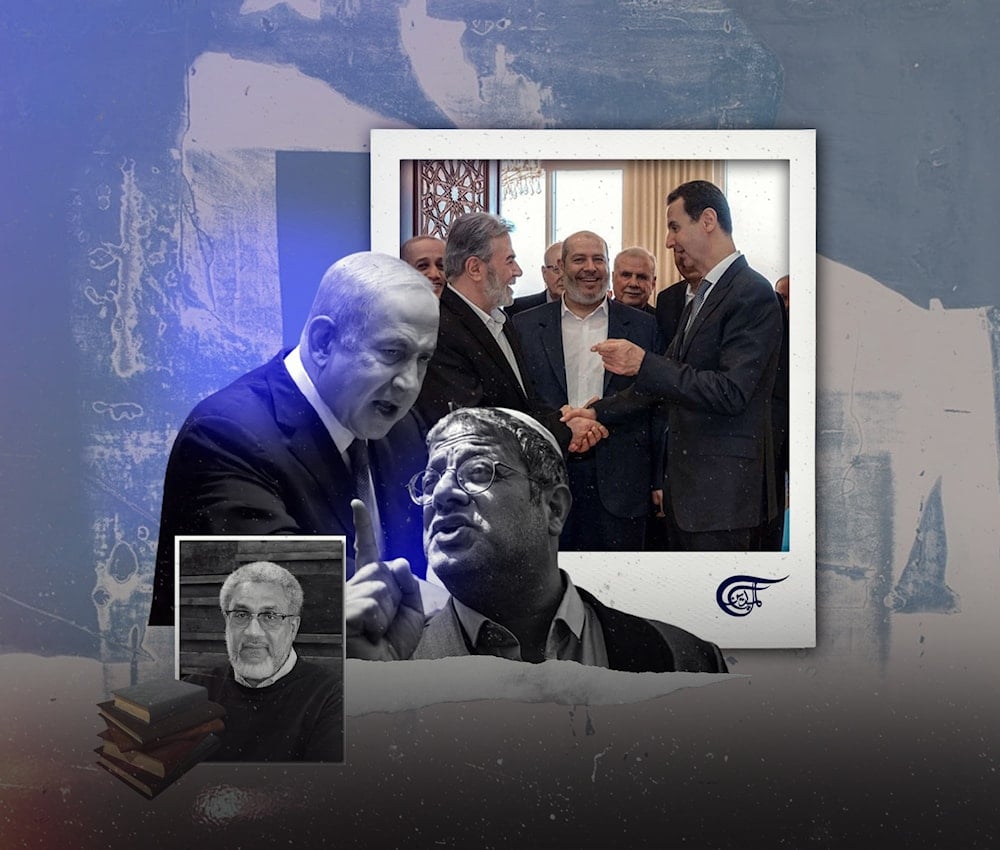Hamas's Foreign Policy: Updating Daud Abdullah's analysis
As the battle for Palestine rages on, the patient and calculated tenor of the Axis of Resistance will provide us with a beacon toward total liberation.
-

The unity of the Resistance from the river to the sea is not only inspiring from afar, but has yielded practical results for the Palestinians. (Al Mayadeen English; Illustrated by Zeinab El-Hajj)
Daud Abdullah wrote an erudite and comprehensive analysis of Hamas’s foreign policy which was released by the Afro-Middle East Center (AMEC) in 2020. The majority of the writing was done in 2019, and thus there are a few lacunae based on the last 5 years of world affairs.
On the world scale, the Covid-19 pandemic rocked production, distribution, and public health sectors; the Russian special military operation in Ukraine gave us the first of a series of likely wars in the decline of Atlanticist hegemony. In Palestine, the “Unity Intifada” -- also known as Seif Al-Quds battle–highlighted the connectivity of the various Resistance factions within Palestine.
Now, today, Operation Al-Aqsa Flood and its aftermath have changed the regional geometry, with even more unity among all factions of the Axis of Resistance across the region.
I will first analyze some of Abdullah’s policy prescriptions for Hamas based on the world situation in 2020, and then see to what extent these policy prescriptions have been undertaken by the Islamic movement or to what extent they still require action. In this article, three elements of Hamas’s foreign policy stick out to me: their relations with Russia and China, the shifts and reconfigurations of the Axis of Resistance, and finally, Hamas’s ability to politically and diplomatically maneuver after October 7th.
The first topic to discuss revolves around Hamas’s relations with Russia and China.
Abdullah’s analysis of Hamas’s relations with Russia and China is one of the most honest, sober, and important analyses I have read in some time. With reference to Russia, Abdullah points out that early on in Hamas’s existence, Russia was willing to break with the iron grip of the Quartet and defend Hamas from the ‘terrorist’ label. Hamas officials and delegates have gone to Moscow on a number of occasions, the latest being in early 2024. At these meetings, Hamas has been treated as a regular political party and a representative of the Palestinians, which has afforded the movement and its leaders meetings with high-ranking officials in Russia, such as Sergey Lavrov.
Yet, the two-headed eagle of Russia stands at a crossroads still. While Ukraine has fallen out of the news cycle, the war is slowing down and there have been some signals of a peace treaty in the near future. Putin–and Russia–understand that the Ukrainian regime are puppets of the imperialists tasked with bringing down the Eurasian superpower, yet this analysis is not extended to “Israel”. Why is this? Is it that a great many “Israeli” citizens are of Russian origin? Is it because Putin, like the double-headed eagle of Russia’s standard, is balancing his role as the post-Soviet liberal statesman and his role as the Eurasianist Hercules whose sword hovers over the Gordian Knot of NATO imperialism? This delicate balancing act will have to come to an end, especially with the carnage wrought by “Israel” and the USA in Gaza today.
With reference to China, Abdullah does not spare the People’s Republic from criticism of their position vis-a-vis Palestine and Hamas. While China–like Russia–has from the start shielded Hamas from the ‘terrorist’ label, and has treated Hamas as a legitimate governing party, they are involved in their own balancing act.
China has extensive trade relations with the Zionist colony, and uses this along with their recognition of Hamas as a means to try and enter the region as a ‘fair and honest peace broker’. While their brokering of rapprochement between Iran and Saudi Arabia is laudable, China is yet to use their global clout to help isolate and sanction the Zionists. It still clings to the dead and buried ‘two-state’ solution as their official position.
Yet as Abdullah points out, the relationship between the more radical Chinese intelligentsia and the Chinese state is a close one, and one which Hamas should exploit:
As things stand, China’s intelligentsia are increasingly questioning whether the ‘keep a low profile’ policy is fit for purpose in the twenty-first century. In this context, Hamas has nothing to lose and everything to gain by positioning itself to benefit from changes that seem imminent in China’s foreign policy.
The above quote from Abdullah is one with which I agree; Chinese intellectuals, such as Zhang Weiwei and Minqi Li, are theorizing multipolarity and the ongoing fall of US hegemony. The Chinese intelligentsia are also involved in President Xi’s ideological campaigns in the PLA, which aim to politicize the army and involve them further in socialist construction. The growing rift in Sino-US relations is an opportunity for Hamas and the Palestinian national movement.
Hamas’s reconciliation with the Assad government in Damascus is an important development after the two parties had differing stances on the civil war and eventual proxy war in Syria in 2012. This subsequently improved relations between Iran and Hamas, which had suffered after 2012 as well. The ability of Hezbollah, and indeed Sayyed Hassan Nasrallah himself, to orchestrate this reconciliation shows the seriousness and importance of the Arab strategic depth.
A driving force of this reconciliation was the 2021 ‘Unity Intifada’ and the shifts on the ground in the region which have strengthened the Resistance. The 2021 ‘Unity Intifada’ is important for a number of reasons, primarily that the Resistance in Gaza–the liberated land base from which the national liberation struggle is being launched–and the Resistance in the occupied territories went hand-in-hand into battle for the first time since the Hamas-Fatah split in 2007.
The unity of the Resistance from the river to the sea is not only inspiring from afar, but has yielded practical results for the Palestinians. The internal crises of the Zionist colony highlight the contradictory trend: while the Palestinians are uniting after years of division, the Zionists are at each other’s throats. The unity of the Resistance and the disintegration of social relations in the colony continue today, in the midst of Operation Al Aqsa Flood.
Since October 7, Hamas and other Resistance factions inside Palestine (notably PIJ, PFLP, and DFLP) have relentlessly unleashed a guerilla war on the Zionist colony. This has not led to military victories alone; Hamas has the potential to come out of this in a better position diplomatically. As with all things, this depends on the balance of forces. Hamas has insisted that the only end which they see fit in any ‘ceasefire’ is an all-for-all prisoner swap. The magnitude of Palestinian prisoners compared to “Israeli” ones is already a numeric victory if this is to happen, and it seems that the Zionists may have to concede to this because their American masters are attempting to tighten the leash. Yet, why should Hamas stop there? The Ansar Allah forces in Sanaa have shown their willingness to disrupt global trade in support of Palestine.
Hezbollah is showing signs of escalating battles on the northern front, which is not an irrational fear for the Zionists given what happened in 2000 and 2006. So how could Hamas secure a larger victory? If the Resistance is able to enfeeble the Zionists and settle a temporary truce at the 1967 borders, that then increases the size of the land base and improves the logistics for launching a war of total liberation because there will be some territorial contiguity. This would also shift internal developments in Palestine, such as the potential formation of a unity government which gets rid of the comprador elements of Fatah. Indeed, PCPSR polling shows that the corrupt PA is as unpopular as ever.
The potential creation of a unity government then opens diplomatic space for powerful countries like Russia and China to support one democratic state, which they currently do not. As the battle for Palestine rages on, we will indeed see how Hamas’s foreign policy space waxes and wanes. As always, the patient and calculated tenor of the Axis of Resistance will provide us with a beacon toward total liberation.

 Hanna Eid
Hanna Eid
 8 Min Read
8 Min Read











